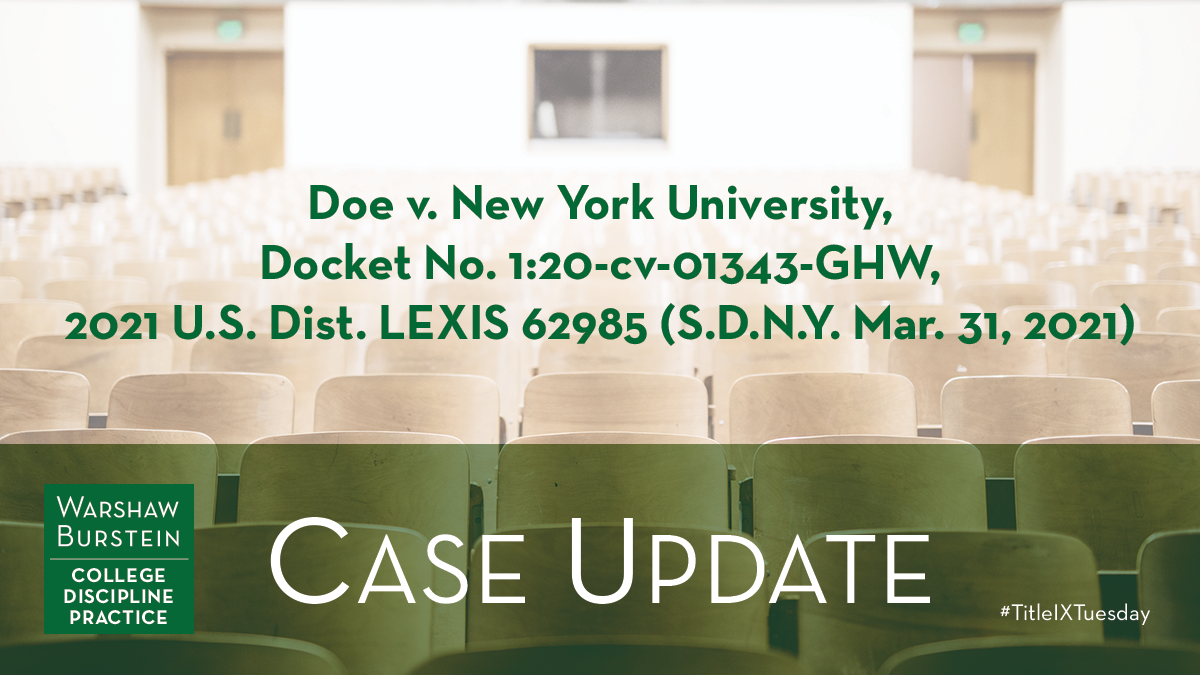-
Doe v. New York University, Docket No. 1:20-cv-01343-GHW, 2021 U.S. Dist. LEXIS 62985 (S.D.N.Y. Mar. 31, 2021)
05/25/2021
 John Doe was dating Jane Roe, a fellow undergraduate student at NYU, but the relationship turned toxic, and both students accused the other of violating NYU’s policies. Allegations show that NYU did not investigate John’s allegations against Jane but did investigate Jane’s allegations against John. The advisor appointed by NYU promised that the highest sanction John could receive if found responsible was a one-semester suspension. However, after being found responsible for stalking, sexual harassment, and sexual exploitation, John was expelled by NYU. John appealed the findings against him, but the decision was upheld. John then filed this lawsuit alleging violations of Title IX and NYCHRL, and promissory estoppel. The Court held that John stated a claim for Title IX erroneous outcome, Title IX selective enforcement, NYCHRL, and promissory estoppel for receiving a sanction above and beyond what John’s advisor promised.
John Doe was dating Jane Roe, a fellow undergraduate student at NYU, but the relationship turned toxic, and both students accused the other of violating NYU’s policies. Allegations show that NYU did not investigate John’s allegations against Jane but did investigate Jane’s allegations against John. The advisor appointed by NYU promised that the highest sanction John could receive if found responsible was a one-semester suspension. However, after being found responsible for stalking, sexual harassment, and sexual exploitation, John was expelled by NYU. John appealed the findings against him, but the decision was upheld. John then filed this lawsuit alleging violations of Title IX and NYCHRL, and promissory estoppel. The Court held that John stated a claim for Title IX erroneous outcome, Title IX selective enforcement, NYCHRL, and promissory estoppel for receiving a sanction above and beyond what John’s advisor promised.
To state a claim for erroneous outcome, a plaintiff must (1) cast some articulable doubt on the accuracy of the outcome of the disciplinary proceeding; and (2) allege particular circumstances suggesting that gender bias was a motivating factor behind the erroneous finding. Here, John alleged his ability to meaningfully participate in the hearing was impaired by technical issues. John alleged he was forced to attend his disciplinary hearing remotely while studying abroad in Australia. The hearing was hampered by audio difficulties, and the video had to be turned off for part of the hearing. Technical issues made it difficult for John to understand the questions he was asked and respond accurately. Additionally, Plaintiff did not have access to relevant exonerating evidence because it was stored on a hard drive in the United States. Accordingly, John alleged sufficient facts to cast doubt on the accuracy of the outcome of the disciplinary proceeding.
John also alleged particular circumstances suggesting gender bias motivated the erroneous findings. John pointed to social media posts criticizing NYU’s handling of other sexual misconduct cases, including the handling of allegations made against a female professor.
To state a claim for selective enforcement, a plaintiff must allege (1) similarly situated members of the opposite sex were treated favorably; and (2) specific facts that support a minimal plausible inference of discrimination. As discussed above, prong two was met. As for the first prong, the Court held that John must be similarly situated in all material respects to Jane for her to be a comparator. Jane and John both tried to file complaints about an encounter in Washington Square Park, but only Jane’s was investigated. John also tried to file a complaint against Jane for sexual harassment, gender-based harassment, and stalking, but Joh was told he needed to wait until the conclusion of the disciplinary process before he could file a complaint against Jane. The Court held that John and Jane were similarly situated. Thus, John’s selective enforcement claim survived.
Because Plaintiff’s Title IX claims survived, so too did Plaintiff’s NYCHRL claim. Additionally, the Court allowed Plaintiff’s promissory estoppel claim to proceed because the allegations showed that John deleteriously relied upon his advisor’s promise that the sanction would be, at most, for one semester. Because of the respective roles of John and his advisor, John’s reliance on this promise was reasonable.
Blog
